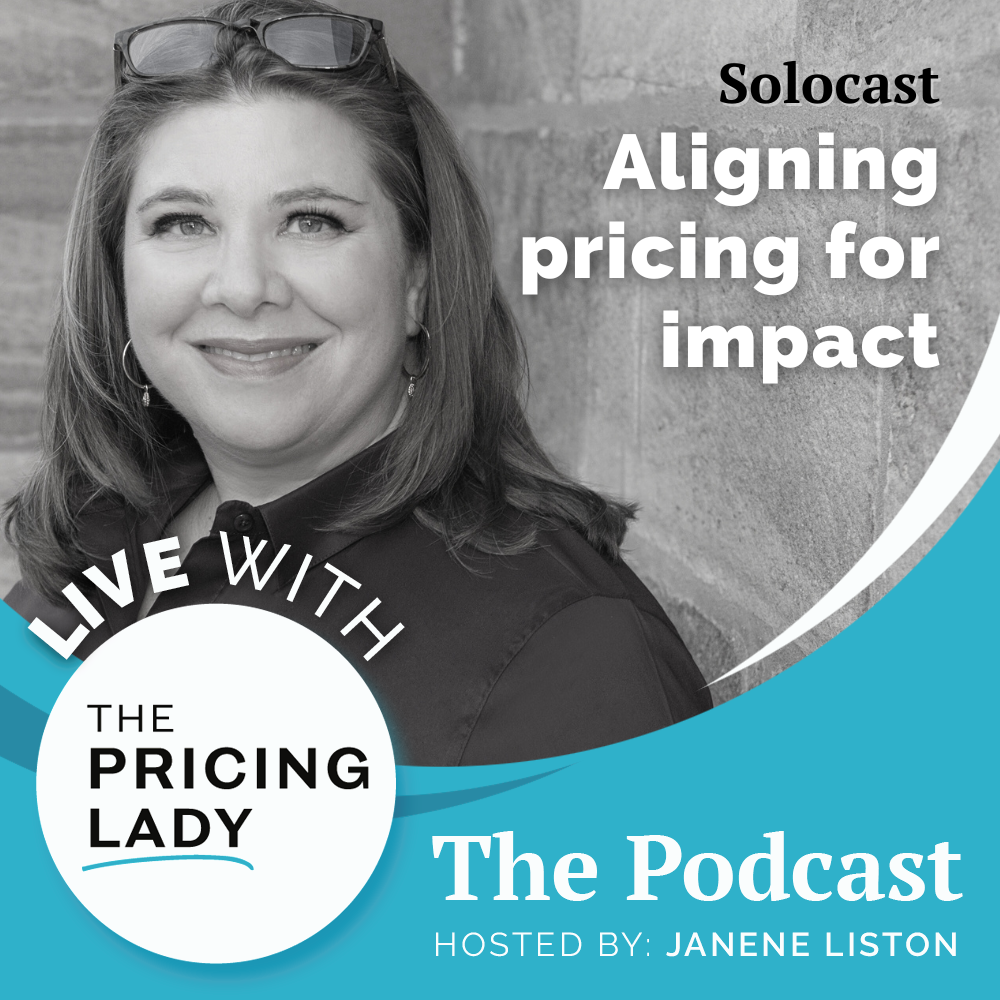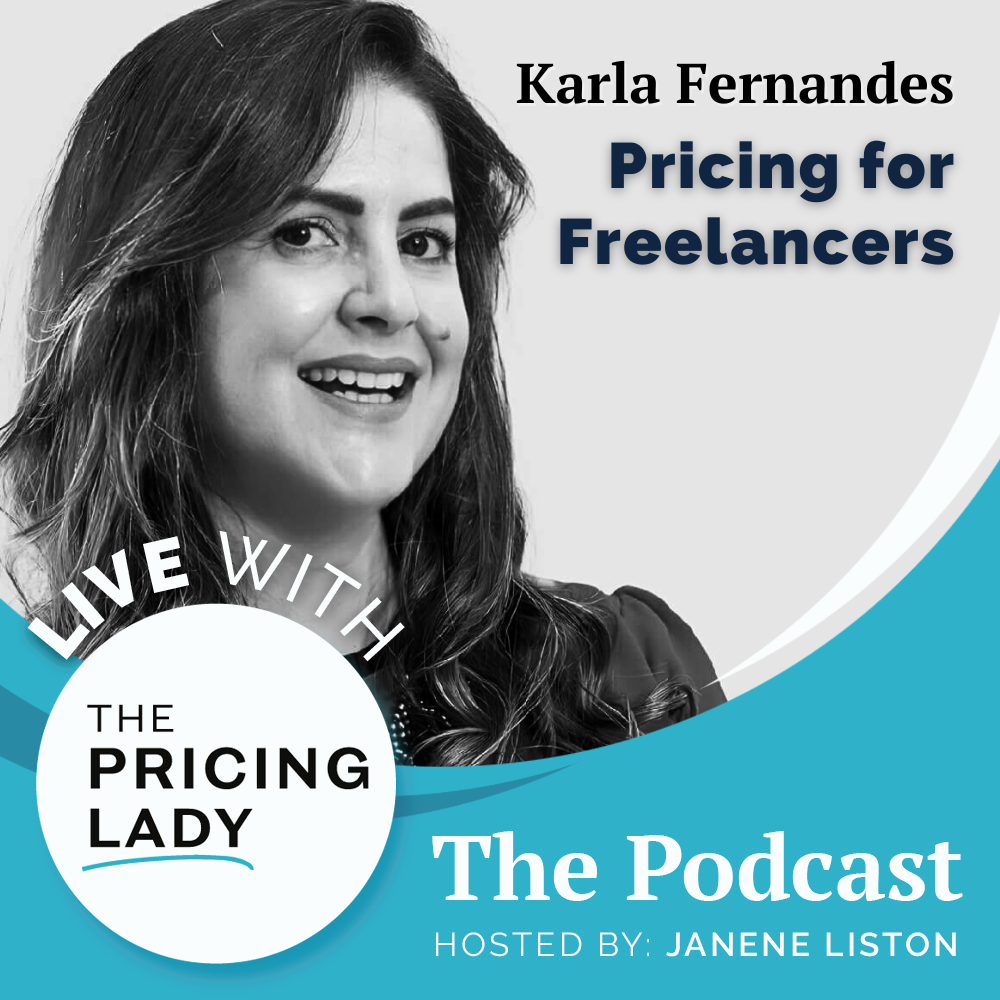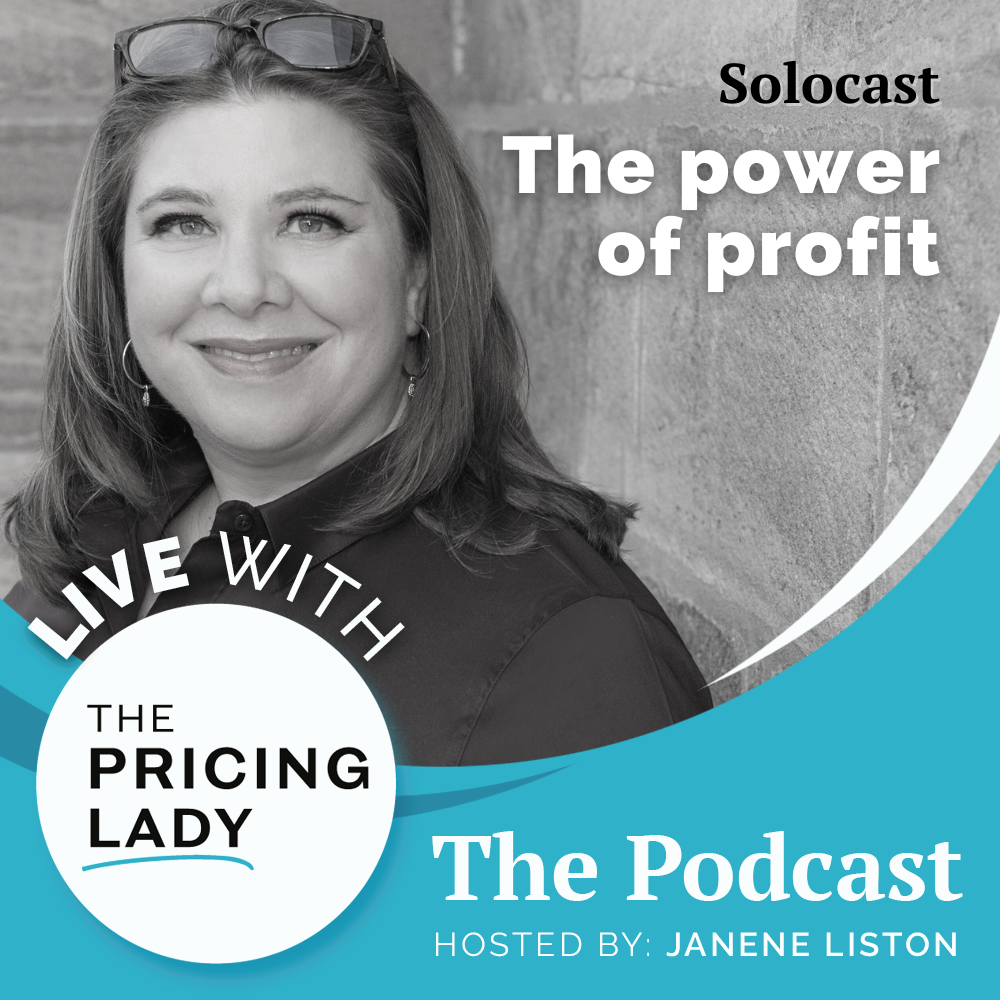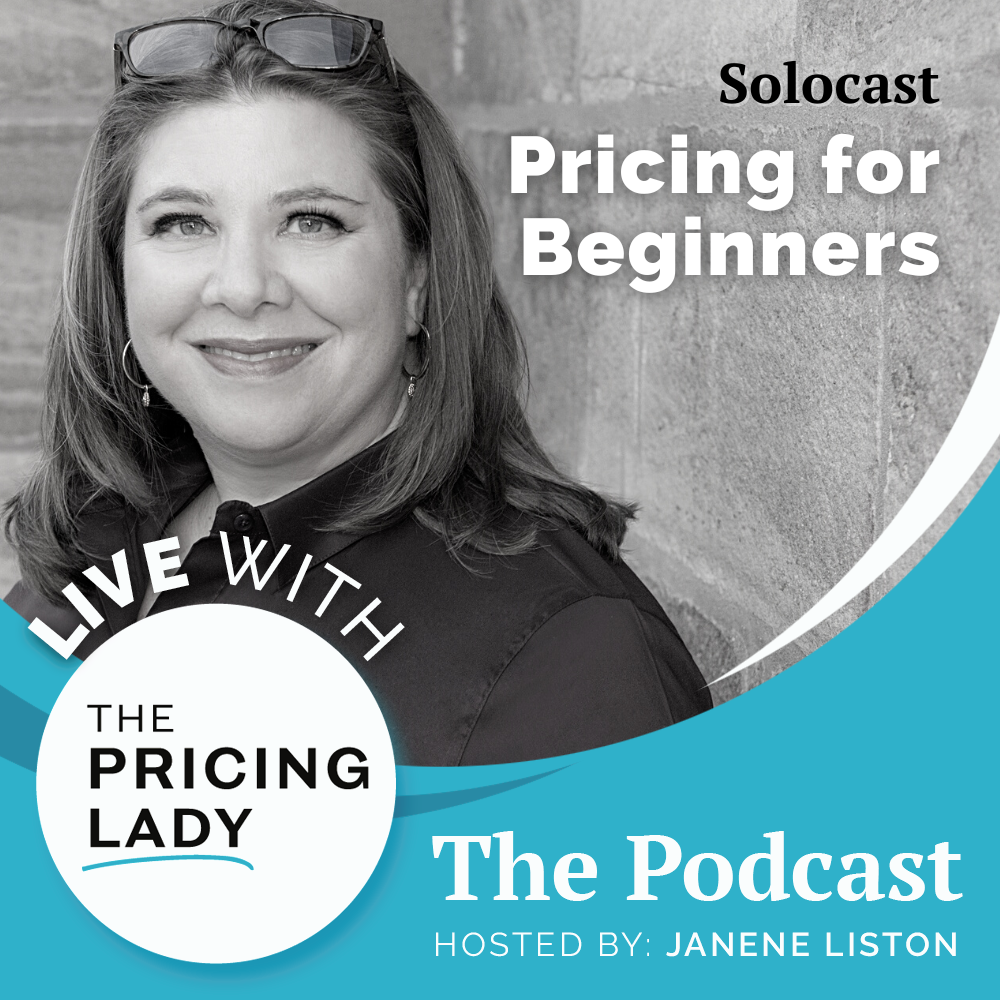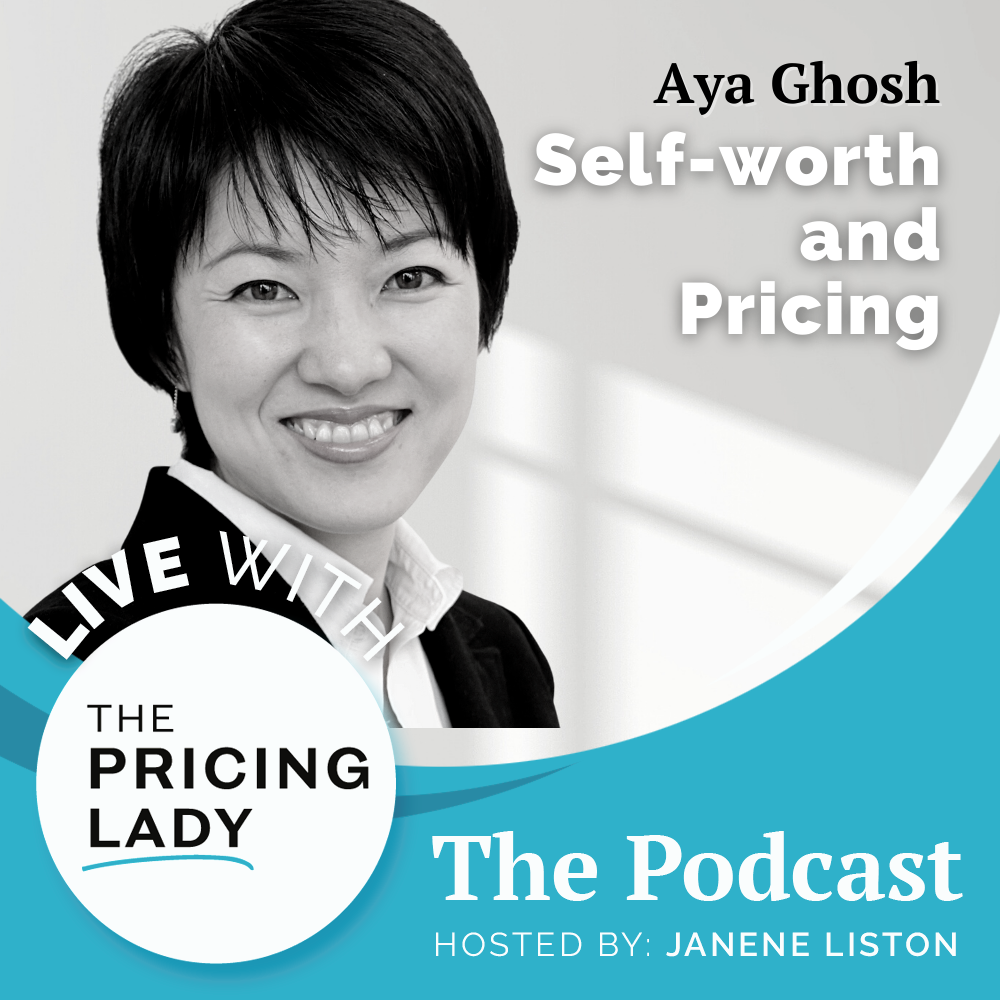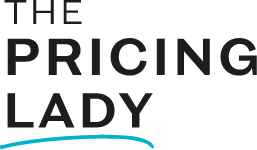Have you ever said to yourself “I can’t charge that. I feel like an imposter”?
Many business owners have and do feel that way. If you do then you’re not alone. It’s more common than you think. It’s not bad nor are you stuck with that. When it comes to pricing, most people don’t understand the economic value of their offer. Nor do they have a clear way to set prices they feel confident about. Without that how could you possibly feel that confidence you seek.
We pile the pressure on ourselves and are sometimes suffocating under the heaps of expectations others toss our way. It’s no wonder so many people feel twinges of imposter syndrome. Pricing often brings out a lot of internal conflict around money, success and worthiness. It doesn’t do you, your business or customers any good.
We know what it feels like, but the real question everyone is asking is…
“What do I do about it?”
This is why I invited expert guest, Sherine Lovegrove, to join me for an episode. She helps women suffering with Imposter Syndrome (who self-sabotage, procrastinate and sophisticatedly hide) to walk their path with more confidence, power and grace.
In This Episode
We had a frank discussion about the relationship between imposter syndrome and pricing. She talks about what it is, how to notice it, and what to do to start shifting. She also shares with us her own pricing journey and the role imposter syndrome played in how she went about setting and communicating prices. No matter where you are in your business journey, there’s a message here you’ll want to hear.
If you prefer, you can watch the video of this episode. Note the highlight timing is different.
Episode Highlights
- 1:31 Getting to know Sherine
- 2:18 What is Imposter Syndrome
- 3:40 The difference between Self Doubt and Imposter Syndrome
- 4:23 How to Identify It & It’s Roots
- 6:39 What’s the relationship in the context of Pricing
- 8:20 Sherine’s Experience with IS in Pricing
- 11:05 What to do?
- 14:40 The Myth of Lack
- 17:13 Expansion Comes with Uncertainty
Favorite Quotes
“If you can’t exit this (negative) loop, you’re going to suffer. You’re going to go back into that cycle and really feel very, very scared. It doesn’t matter what, anyway, says to you, you don’t listen to them. You end up a ‘yes, but’ person.” Sherine Lovegrove
“Imposter syndrome is about performance.” Sherine Lovegrove
“I think it comes from, I’m a not good enough. If you look way back, you’ll often find there’s been an experience in your life where you have had such a profound effect from having that moment of not being good enough, that never recovered. You didn’t have anybody around you to help you through that process in a more resourceful way.” Sherine Lovegrove
“One negative requires seven extra things of praise before you can undo one negative thought.” Sherine Lovegrove
“I hear it (the self-doubt) quite often as an intonation. I’ll ask someone to say, oh, what do you charge for that? And, they’re like $500? Are you asking me, are you telling me? ” Janene

Episode Links
- Linkedin: https://www.linkedin.com/in/sherinelovegrove/
- Facebook: https://www.facebook.com/sherine.lovegrove
- Website: https://www.sherinelovegrove.com
Connect with Janene
Website | Linkedin | YouTube | Facebook | Email List
Get started improving your business. Sometimes it’s difficult to know where to begin. I suggest you Download the the self assessment Pricing Scorecard. Get a view of what’s working and what’s not working when it comes to pricing in your business. Figure out where to start making improvements.
Get in touch with Janene. If you’ve got a question that needs answering, a challenge you’re facing or you have suggestions for future topics or guests, let me know. Contact Janene.
Listen up! Don’t miss out. There’s a lot going on and you’ll want to be in the know. Follow my YouTube channel (rate it too please) so you don’t miss an episode of Live with the Pricing Lady or join my Email List.
Transform your business and life. My business is about helping you build a better business. One that’s profitable and where you can confidently charge for the value you deliver. Let’s see how we can work together. Book a complimentary Discovery Call today!
Episode Transcript
Janene: Sherine, why don’t we start this off and you tell us a little bit about what you mean by imposter syndrome. Let’s make sure everybody’s on the same page first.
Sherine: Yeah. Okay. But they’re interesting, you know, 70% of women will suffer from imposter syndrome. But in actual fact, everyone suffers with imposter syndrome at some level or other. Because when we move from one level to another, there’s a sense of confidence that is not matching where we are now to where we want to be.
So we start looking back and reflecting. We think we are missing out. We haven’t grown into that new role yet. So what often happens is we may actually start to doubt ourselves and we will start to do actions that will affect us. In a sense of stopping us, going out there and doing the job that we maybe have been desperately wanting to do for a very, very long time.
Imposter syndrome is really based on how we perform. Yes. There’s lots of very deep levels of belief structures that sit underneath that. And sometimes we can correct, but if you have real embodied imposter syndrome, you don’t correct. You don’t go back and say, okay, well this is just me going through my wobble.
Yeah. This is me going through my wobble, but I’m still not feeling better. Right. I’m still suffering and I worry and worry and worry.
What’s the Difference?
Janene: Is there a difference between just self doubt and imposter syndrome? Is that the difference?
Sherine: I think it is. Imposter syndrome is where you you’ll start to think that you don’t belong. You’re so anxious. You can’t actually validate the pleasure of a past experience. You can’t say, well, I’ve done it now, or I can do it again. It’s kind of like, oh God, when’s the next opportunity that I’m going to have to do this.
If you look at the cognitive model, you don’t have an exit loop. You don’t get the reward, you don’t feel the reward. And so you keep going back in the cycle, right? Yeah. Okay. So that’s really what happens all the time.
Janene: What would you say is one way that you can then identify that this is something that you’re suffering from? I hate the word suffering, that you’re experiencing.
Sherine: We are suffering when, we’re not happy. We’re always suffering when we’re not happy. If we’ve got a very resilient mindset or an anti-fragility mindset, that means we will bounce back very quickly. Yeah, we go. Oh, okay. So yeah, this has happened. I believe all of life is conspiring to help me. So let me see what’s going on here and let me move forward.
But someone that’s had that, has a resistant self-doubt. They can’t get past that. It’s based on deep anxiety. If you can’t exit this loop, you’re going to suffer. You’re going to go back into that cycle and feel very, very scared. It doesn’t matter what, anyway, says to you, you don’t get to listen to them. You’re going to, be a “yes, but” person.
What’s the Source Of Feeling Like an Imposter
Janene: Okay. Interesting. And what are the roots? Where does this come from?
Sherine: I think it comes from I’m a not good enough. Yeah. If you really look way down and you go back and back and back and back, you’ll often find there’s been an experience in your life where you have had such a profound effect of having that moment of not being good enough, that you didn’t really recover.
Okay. And you didn’t have anybody around you that perhaps could help you through that process in a more resourceful way. And very often, you know, people that have suffered from a lot of childhood former, and that’s not like you don’t have to be beaten to have it. You can just have somebody that just doesn’t believe in you and constantly grinds and grinds and grinds that you can end up in that same.
Janene: Right. I guess it wouldn’t even be, you can perceive that someone doesn’t believe in you.
Sherine: Yeah, exactly. Exactly. You know, it’s really interesting. One negative requires seven extra things of praise before you can undo one negative thought. Believe it or not. Isn’t that crazy? Yeah. It was very crazy.
Janene: Yeah, absolutely.
How’s it show up in pricing?
So Sherine, when it comes to pricing, of course, from my side, I hear and see this reflected in people’s behavior all the time. I’m curious from your own perspective, how do you think that the shows up in people’s businesses in relationship to their pricing.
Sherine: Well, first of all, one of the things is when you are thinking about going out and touting for any business, you’re already running with this mindset .
While you’re in that interview, you’re already thinking about, I’ve got to ask this price. I got to ask this price and this builds, this fear going up. So that when you do ask or no, you probably would allow yourself to give a discount before you’ve even asked for your price, which is often what you do.
You sell yourself short. So you often undervalue yourself or you can’t see the value of your product. And if you can’t do that, then you can’t be congruent with your product. So I think that chronically take discounts instead of saying, well, no, actually I don’t offer a discount and actually I think I’m good enough go to somebody else if you really need to, but this is what I do.
And this is how I can give you value. And the problem is they don’t, they don’t say this is how I can give you value. Right. So, you know, if that makes sense. And so it’s really important that first of all, you know, of course your value, but secondly, to just give a discount because you’re uncomfortable because of that feeling is just not helpful. Yeah.
Standing Tall in Your Value
Janene: Right. Actually, it’s usually quite destructive both to your profit and to the value. And then also to your, your psyche and your mental, it kind of. It feeds that loop that you get stuck into when you’re in that imposter syndrome.
Sherine: Yeah. Yeah. And I know personally from my own experience. Yeah. Because this is where I realized I had it and it was when I was actually asking for a raise in my price.
I decided I was going to put my prices up and then everybody would say, you know, that’s really expensive. And I’m going actually, this is not as expensive as somebody else I know. And they’re doing less than I do. This doesn’t make sense, but it is because you don’t sell your value. And so people question when you don’t sell your value, that’s it.
So if you actually put your price up and you’re congruent about it and you’re able to say, well, no, that’s exactly what I charge. Then people will just, they won’t even quibble, you know? Yeah.
Janene: And that’s a, that’s a very important for point because you actually have to believe first before most other people believe. Now we all have those friends who believe in us more than we believe in ourselves.
Right. That’s the exception to the rule. But you know, you really have to believe in not only what you’re offering and the value that you bring, but that you have the right prices before other people will believe as well. Because what happens is they sense that incongruity. You say, this is my price, but you say it with a proverbial question mark. Right. And people sense that.
Don’t Ask, Tell
Sherine: Exactly. And you know, most of our communication is non-verbal right. And the interesting thing is the moment. Yes, there’s this, the face stuff that we can see, but if you’re on the phone or you’re on something that. Sound is so quick at know, just a slight change in tempo light, anything automatically creates something going on in our system. And we will, there’ll be an, a disconnect there.
And so that’s why our clients don’t don’t want to buy from us if we’re not congruent with ourselves. Because our voice is not low. We’re not smiling. We’re kind of stressed out looking desperate, but actually that’s really part of what the problem is.
Janene: Oh, yeah, I hear it quite often as an intonation. I’ll ask someone to say, oh, what do you charge for that? And, they’re like $500? Are you asking me, are you telling me? Yeah.
Sherine: There’s something about always lowering your voice at the end of, you know, it’s a skill, but it is about making sure you keep that voice really low and soft, gentle, and just really to the point.
What to Do When you Feel Like an Imposter
Janene: Right? Right. We’ve talked about what it is and how it affects. So it begs the question when we recognize it’s that’s the cycle that we’re in. What do we do?
Sherine: Good question. What do we do? I think that there’s really some, there, there are some mind hacks and I had a beautiful one this morning when I was just listening to a podcast and I thought it was really lovely. And part of, part of you thing is if you don’t have value or you’re not important, or you, you know, you’re not special in the sense that you are everybody, every human being is special.
And the thing is when we don’t acknowledge that we are equal to everybody. Then it makes it really hard. It’s important before you have an interview before, you do anything make sure you stand in your power. You start to think about all the things about why, why someone should be there for you, why they should come to you think about all those things that you do exceptionally well, so that you use those points as the way to hone in. But it also means that it will allow you to keep yourself in that really important place.
The second thing, which was it’s really interesting, the moment you get slightly stressed. When I say slightly stressed, something happens, a negative thought jumps in you move forward in a different way that then cuts off circulation to the brain. And that means you now go into that stress cycle. Just sit back, sit back, square your shoulders up, and just allow yourself to breathe down here. Because then in that moment, you give yourself time to collect yourself and be able to say something that’s helpful.
Buying into the Myth of Lack
Janene: Hi, Joanne. Thanks for joining us. Her question is about being reluctant to charge the 2 9, 9, 7 for her program during COVID for her holistic hair loss training. It’s a six month program. I’d like to address that question first. What questions do you have for her? And what can you say to her to help with that uncertainty she feels?
Sherine: Yeah. You know, there are a couple of things. I mean, one of the things is, is to really look as about the value. I think, you know, the idea that this is about hair loss and correct. This is about, is, is it hell? I mean, I’m not quite sure. Is it hair loss? Like what, what is the hair loss kind of thing? So what is it that makes us think it’s not important?
That’s the thing, because this is about, you know, him most nervous about is important issues. Thinking that the product is not important. That means that she’s, there’s an lack of congruency between the product that she’s selling and the thing of charging. Isn’t it. So if she’s aware of thinking, okay, if somebody really gets value out of dealing with, you know, I can help them with a hair loss.
And how does that make their lives? Does it transform their life, then? You know, something you should be paying more charging. Yeah. Yeah. Because if you’re transforming someone’s life and you’re making it better, then COVID or no, COVID people will buy. I think there’s a real misnomer in thinking that COVID is an exceptional time for not buying things and putting your prices low. I think that’s, you know, this right? You buying into the myth that there’s lack.
Sophisticated Hiding
Janene: Let’s be fair. There are people who are struggling, who aren’t getting paychecks. I don’t want to diminish that in any way, shape or form. I agree with you that we shouldn’t assume something for other people. This is something I talk about with my clients. If you’re assuming right from the start that they can’t afford it, that’s almost an insult to the client. That’s their decision to make whether or not they have the means or the resources to be able to make that investment.
You should charge for the value you’re delivering. Of course you may want to do something exceptional from time to time. You want to be supportive of people, but I would say you still need to hold that price there. And then handle exceptions. If that’s really what you think is the right thing to do in that moment.
But don’t use COVID or some exceptional situation like that as an excuse to doubt the value that you bring people.
Sherine:That’s what I’d call sophisticated hiding using.
Janene: The program is actually to teach hairstylists.
Sherine: Right. Okay. Yeah. And hairstylists are gonna really need jobs when COVID is over.
It’s a very valuable thing you’re offering and, you know, looking good is very important for our sense of self-esteem. I think it’s, it’s, it’s a beautiful thing, but I also think, you know, as you said something with the idea of making exceptions. Make it easier for them to pay. Don’t drop your price. Make it easier for them to pay for example.
Janene: I talk about adding a deal sweetener, it’s similar. The price is going to be the same, but during COVID, I’ll give you this bonus. Which is another way to adjust value without destroying the value of your original offer.
Pricing It Tricky When You’re Unsure
So thank you Joanne so much for your question. I’ve hope that we’ve given you some insights. Sherene. I had a couple of questions here and somehow in setting things up, I misplaced my notes. I won’t keep looking for them. But I had asked you a few questions and one of them was about your biggest pricing challenge. Can you maybe tell us a little bit about your own experience when it comes to pricing in your business?
Sherine: Yeah. When I was a therapist and I am putting the prices up and then getting used to it. And I think there’s, there is something about knowing it’s going to be uncomfortable to start. When you move from one area to another you growing into that price. Yeah. You’re shifting a little bit.
My most difficult time was when I was doing my first couple of courses and coaching. I was trying very hard and realized that as I was getting towards the end of the conversation, I was getting more and more tense. What really.shifted for me. was when I had a few failures. Then I started to write down, as people were talking to me, I would write down the things that fit with my program.
So I could more clearly say, I can help you here. You said this, I can help you here. I was very specific. I would follow up with an email saying these are the three things you came to tell me about, this is how I can help you.

